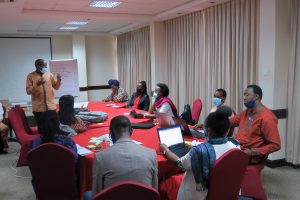25th November , Kigali Rwanda , the Global Green Growth Institute (GCF delivery partner) and Rwanda Environment Management Authority (NDA) co-organised the workshop for the GCF NAP Project on the role of the private sector engagement and elaboration of concept notes for selected sites in the city of Kigali namely Magerwa/Rwandex and Mpazi. The workshop had a diverse group of participants from REMA; Rwanda Green Fund (FONERWA) ;Prime Insurance ; RTDA ; PSF ;Rwanda YWP ; Skat ;Roto ; Magerwa ; Radiant Insurance ; Volcano Group. Participants in the workshop represented either an institution , a potential implementation partner , or a site specific stakeholder in particular to fundamental role they play in the GCF National Adaptation Plan (NAP)
The GCF NAP aims to build flood resilience capacities in Rwanda in line with governmental policies , strategies and priorities’ and ultimately enhance Rwanda’s capacity to respond to climate change in high risk zones by implementing a National Adaptation Plan(NAP) for integrated flood and landslide management in urban areas.
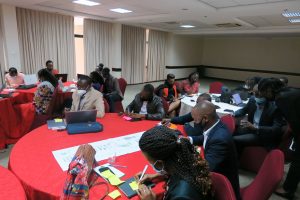
The workshop was organized to initiate a discussion on project pipelines under the GCF NAP with a fundamental component of engaging the private sector by exploring their role in building flood resilience and capacities. The workshop aims to achieve Sub-outcome 2.3 on developing concept notes and financing strategies for local climate action in prevention of flood and landslides. The key objectives of the workshop was to:
- Conduct a collaborative review of the GCF criteria and the concept notes ;
- Introduce the private sector engagement approach ;
- elaborate how the private sector can be engaged in the Mpazi and Magerwa-Rwandex sites in City of Kigali and
- site exploration for potential opportunities and challenges
On 18th June 2020 the GCF NAP Readiness and Preparatory Support for Building Flood Resilience Capacities in Rwanda was launched with the following specific outcomes:
Outcome 1: Capacity and coordination strengthened for main institutions to effectively mitigate floods and prevent landslides.
Outcome 2: Appropriate technical studies identified and prioritized, climate finance strategies and project pipeline strengthened for effective storm water and landslide management in Kigali City and urban areas experiencing rapid growth and highly vulnerable to floods and landslides outside Kigali city.
Outcome 3: Knowledge management, information sharing, and communications strengthened to effectively mitigate floods and prevent landslides.
Outcome 4: Mechanisms for Reporting, Monitoring and Review of adaptation and resilience planning progress developed to gather lessons and integrate them into future iterations of the identified flood mitigation and landslide management planning process.
Since the launch of the project several activities have concurrently commenced such as the elaboration of the scope of the technical studies which included site visits to the selected sites, capacity needs assessment, mapping and elaboration of stakeholder engagement strategies for both the development of the Concept Notes as well as the Gender Assessment.
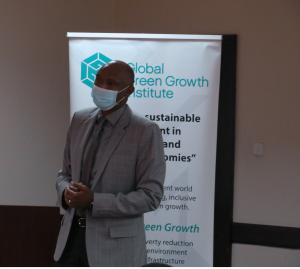
Deputy Director General at REMA , Mr Faustin Munyazikwiye in his opening remarks said “in 2009 is when our country started building resilience by analyzing the economic impact of climate change on the economy, the study conducted that year lead to the development of Rwandas Green Growth & Climate Resilience Strategy (GGCRS). Fast forward to today since January to October 2020, more than 200 people died due to landslide and flood which are the main effects of climate change in Rwanda. Rwanda has developed climate change policy which indicate our current issue and the mitigation measure we should take to either reduce the GHG emission but also to get clear guidance on how we can build resilience of the economy. Therefore it is our responsibility to act and take action with all relevant stakeholders. In most meetings we have government institutions, but today we are grateful for the private sector, the economic transformation we want will not be possible unless the private sector is actively engaged in the process. Todays discussion will help us understand how we are affected ,how are we exposed and what can our role be in climate mitigation”
GGGI Rwanda Country Representative , Mr Okechukwu Daniel Ogbonnaya welcomed the participants and said he is looking forward to todays discussion as a critical step that will lead to effective project implementation by involving all key players in the sector. He reiterated that the private sector plays a vital role when we discuss policy implementation and climate action towards clear mitigation and adaptation steps that make Rwanda a climate resilient country. This discussion will help us formulate a baseline for Rwanda’s adaptation plan in urban areas , this will be a continuous engagement process with the private sector for the GCF project as they have a major role.
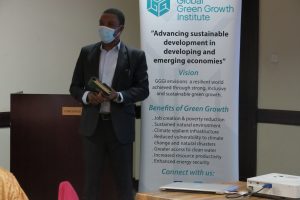
Ms Liliane Mupende GCF NAP Project Co-ordinator, introduced the GCF NAP project by elaborating first on the gaps identified that lead to some of these engagement activities. Several gaps observed within the sector amongst the key stakeholders such as limited coordination, lack of technical studies, limited access to finance, Lack of private sector engagement , limited monitoring and evaluation, lack of awareness. Leading to the consideration of specific project outcomes such as strengthening of capacity and coordination , adequate technical studies, knowledge adaptation, mechanism for reporting, gender equality and social inclusion.
Mr Francesco Tetero GCF NAP Green City Dev’t Expert , introduce the Bishenyi Sub Catchment as one of the 5 selected sites due to their uniqueness in flooding and landslide. Rwandex and Mpazi sites are similar in terms of challenges and unplanned urbanization followed by high rainfall. Therefore we are looking at designing urban natural based solutions that will involve the private and public sector.
Mr Mads Knudsen GCF NAP Private Sector Engagement Expert ,explained the importance of the private sector in flood management , and the GCF criteria for private sector. Flood management does require funds in both the private and public sector. This create a synergy between mitigation, recovery, preparedness and response by all the involved stakeholders. The private sector is considered to have more skills and knowledge and can directly raise more funding that can reach more stakeholders , private sector can also provide the necessary resources, training , materials etc. He then lead a group activity to identify potential opportunities and challenges to engage the private sector. Participants were tasked to think about and discuss how does flooding currently affect people in Mpazi and Magerwa ? How can we manage the waste, the soil eroded? How can these problems be addressed by the community and relevant stakeholders?
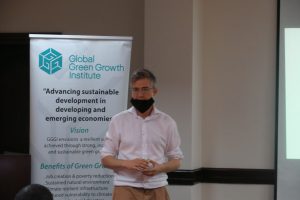
The discussion brought about very practical solutions to be considered by the GCF NAP team as suggestions were made by the different representatives from the many organisations present. Feedback included comments such as Insurance companies can design recovers that are needed in the community based on the data that can be collected ; when government is construction drainage systems or roads they neglect that community participation is low and finances are lacking ; stakeholders must consider better water systems that can manage the fact that households are short of water but have water problems due to floods, this water can be managed with better infrastructure for the water flow , better community participation, access to resources and improved mobilization ; maintaining drainages is costly especially for the vulnerable , one should consider rehabilitation /sceptic tanks ; improved urban development and city masterplans must change business as usual concepts and look at the issues on the ground with the community members affected by these disasters and the private sector.
Mr Herman gave the closing remarks and informed participants that this workshop will continue to gather the necessary information required as we continue to seek advice on the best approach to bring in the technical knowledge that will develop the project design that will deliver solutions on the ground.
